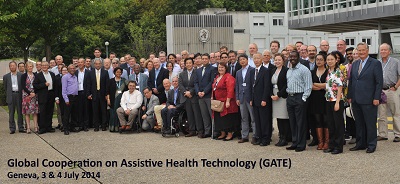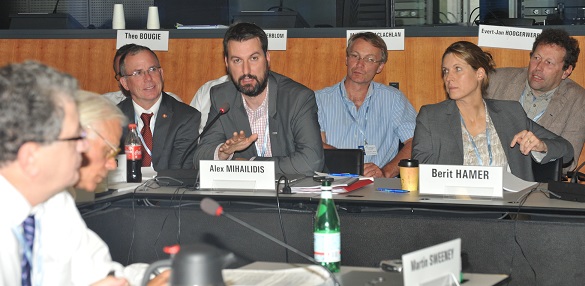Date: Monday, July 21, 2014
Category: General

On July 3rd and 4th, 2014, RESNA President Alex Mihailidis and Immediate Past President Jerry Weisman attended a meeting at the World Health Organization (WHO) in Geneva, Switzerland, called
Opening the GATE for Assistive Health Technology: Shifting the Paradigm. GATE (Global cooperation on Assistive Health Technology) is a WHO global initiative which will engage in partnerships with key stakeholders for improving access to assistive technology. The goal of this meeting was to bring together these stakeholders from around the globe (representatives from the US, Canada, Europe, China, Japan, Australia, and India were present) to discuss an initial concept note that WHO drafted around how to redefine assistive technology in order to take into consideration its wider roles and needs, going beyond the common traditional perception that "these are only for people with disabilities." As part of this meeting, Alex Mihailidis made a formal statement on behalf of RESNA on WHO’s concept note and their plans on how best to proceed on this topic.
Statement from RESNA
Thank you to the World Health Organization and the GATE initiative for inviting RESNA to participate in this groundbreaking and important event. As one of the world’s largest and most active professional societies with respect to assistive technology, RESNA is in support of the GATE initiative and the prospect of increasing the access of AT to everyone.
Let me start with an overview of RESNA. We have approximately 1200 members consisting of AT professionals, including OTs, PTs, SLPs, educators, rehab engineers, researchers, and manufacturers. In addition, an important aspect of RESNA is its' credentialing of AT professionals. Currently RESNA has approximately 4,000 people worldwide who are certified with our ATP credential, where we define an ATP as a service provider who analyzes the needs of individuals with disabilities, assists in the selection of the appropriate equipment or services, and trains the consumer on how to properly use the specific equipment.
RESNA undertook the credentialing process in 1992 to identify qualified providers, test fundamental knowledge, set standards to measure competence, and guide professional conduct. In order to obtain an ATP, applicants are assessed on their work experience in the AT field, and their knowledge is tested in the following areas through an examination: Assessment of need, development of intervention strategies, implementation of interventions, evaluation of interventions, and professional conduct.

RESNA is currently expanding our professional programs outside of the US and North America. This includes re-developing our examination to be more inclusive, and trying to better understand other global contexts as related to AT. In addition, under consideration are other approaches that may be more relevant globally, including certificate programs and other education programs.
RESNA also engages in the development of standards for a variety of AT, including the testing of wheelchairs, sports equipment, evacuation devices, transportation, and most recently, cognitive devices. The RESNA Assistive Technology Standards Boards coordinates the development of voluntary consensus standards in the US and internationally.
Finally, RESNA holds an annual conference, which is a very unique setting that includes clinicians, service providers, researchers, and users all under the same roof. Nowhere else will you find this mix of stakeholders in the AT field.
Next, let me discuss RESNA’s views on partnerships with the WHO and the GATE initiative. RESNA, as a professional organization, agrees with the ideas outlined in the GATE concept note and with the objectives of this endeavor. It is critical that access to AT is pervasive and is not encumbered by issues that currently surround the field— which includes limited knowledge by AT professionals of issues that may affect people living in non-traditional contexts who need AT. However, this goal needs to be achieved within the means and standards that have been developed over the past many years that are in place to ensure the safety and welfare of the clients that our professionals serve. This includes ensuring that standards around safety are upheld, no matter where in the world AT provision is occurring, that proper education and training is provided, and that those providing AT to clients meet professional competencies. RESNA strongly feels that these criteria can be met internationally through the partnerships that the GATE initiative propose and by working in close collaboration with other professional organizations, such as our sister organizations, AAATE, AARTA, RESJA, and others.
Finally, I will present some special considerations that RESNA strongly urges the WHO to consider when moving forward with the GATE initiative. First, there is a broad spectrum of ATs, and a one-size-fits-all approach cannot be taken. There are significant differences between types of AT that need to be taken into consideration when determining how best to ensure effective and pervasive provision of these devices. In addition, care needs to be taken when looking at topics such as de-medicalizing certain types of AT, the changing of the AT term to Assistive Health Technologies which WHO is proposing, and the definition of Assistive Health Technologies and what is included within this categorization. All of these decisions could have negative impacts on professionals and how they are able to perform and provide their services. These issues are especially important when looking at AT that does require reimbursement in order for clients to be able to access and attain the AT that they need.This is also important to consider with respect to the remuneration of AT professionals who’s services are necessary to ensure the safe and appropriate use of certain types of AT, including providing the necessary infrastructures and provisions that are required to help these individuals perform their necessary duties.
Overall it is critical that this and any future endeavor does not alienate or devalue those professionals who are providing AT to those who need it. RESNA urges the WHO and the GATE initiative to proceed in this endeavor ensuring that they fully understand the needs of those who deliver AT and AT services, and recognize the global differences in these professionals and their practices. Like with AT, there cannot be a one-size-fits-all approach.
In summary, RESNA and its professionals and members are in support of GATE and the WHO’s initiatives in the area of AT. We wish to urge thoughtful consideration of those people on the front lines of this field, who are working tirelessly each and every day to provide their clients with the best possible access to AT and AT services. We urge this initiative to work closely with current professional organizations and societies to build upon the numerous years of experience and effort that have gone into building an inclusive and effective AT community. Together with the WHO and the GATE initiative, RESNA looks forward to building a stronger international partnership towards achieving the goals discussed in today’s meeting.